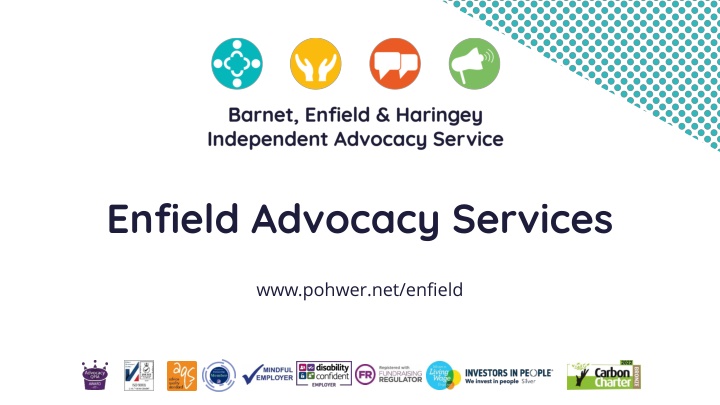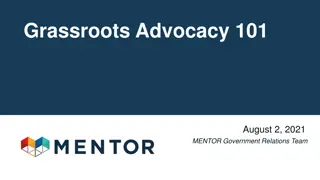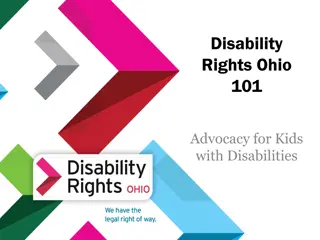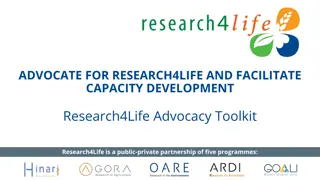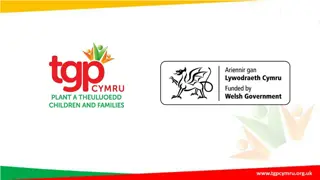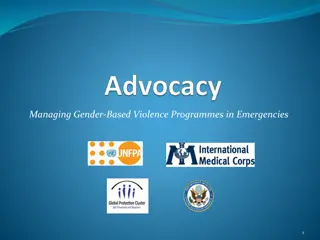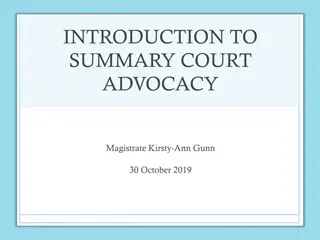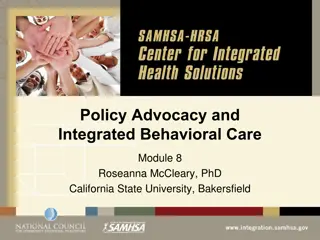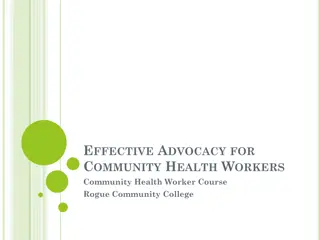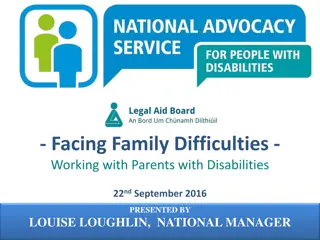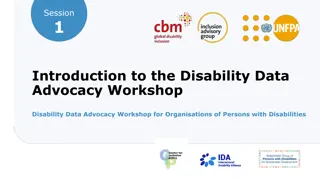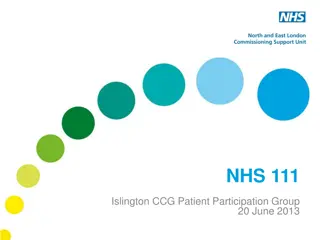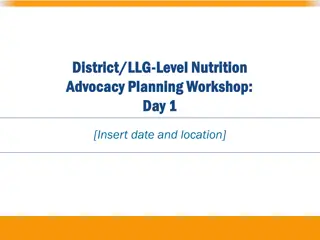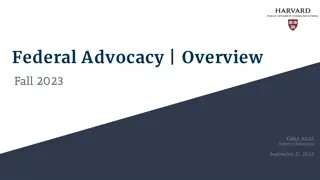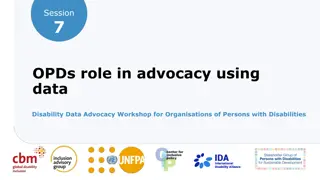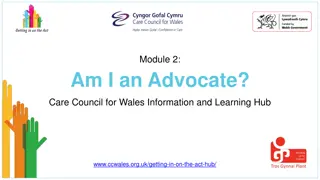Enfield Advocacy Services Overview
Enfield Advocacy Services, provided by POhWER, offer various advocacy programs including Independent Care Act Advocacy (ICAA), Independent Health Complaints Advocacy (IHCA), and Independent Mental Capacity Advocacy (IMCA) among others. The services aim to support individuals in understanding and participating in social care processes. Eligibility criteria and referral processes for Care Act Advocacy are detailed, emphasizing the importance of independent advocacy in empowering individuals. Additionally, information on Independent Health Complaints Advocacy is provided to guide individuals navigating the NHS complaints process.
Download Presentation

Please find below an Image/Link to download the presentation.
The content on the website is provided AS IS for your information and personal use only. It may not be sold, licensed, or shared on other websites without obtaining consent from the author.If you encounter any issues during the download, it is possible that the publisher has removed the file from their server.
You are allowed to download the files provided on this website for personal or commercial use, subject to the condition that they are used lawfully. All files are the property of their respective owners.
The content on the website is provided AS IS for your information and personal use only. It may not be sold, licensed, or shared on other websites without obtaining consent from the author.
E N D
Presentation Transcript
Enfield Advocacy Services www.pohwer.net/enfield
What we do Independent Care Act Advocacy (ICAA) Independent Health Complaints Advocacy (IHCA) Independent Mental Capacity Advocacy (IMCA) - including oRelevant Person s Paid Representative (RPPR) oDeprivation of Liberty Safeguards (DoLS)) Independent Mental Health Advocacy (IMHA)
Care Act Advocacy Advocates can support individuals who are eligible to understand and participate in social care processes relating to the Care Act. Independent advocacy is about giving the person as much control as possible over their life. It helps them understand information, say what they want and what they need. This statutory role is designed to facilitate the client through the assessment process and ensure they take as full participation as possible.
Who is eligible for Care Act Advocacy? Not everyone is entitled to Care Act Advocacy. There are two qualifying criteria: 1. the person has substantial difficulty in being fully involved with their assessment, care and support planning and review or safeguarding 2. there is no one appropriate and available to support their engagement in assessment process and represent their wishes
Care Act Advocacy The local authority can refer for independent advocacy support for an individual who will experience substantial difficulty for any stage of any of the following: a needs assessment, a carer s assessment, the preparation of a care and support plan, a review of care and support plan, a safeguarding enquiry or review.
Who can be referred for Care Act Advocacy? If the client: meets the 2 qualifying criteria, is referred by Enfield, and is residing within the M25 Boundaries. Then they are eligible for an advocate under the Care Act.
Independent Health Complaints Advocacy POhWER NHS Complaints advocates can support a person to navigate their way through the NHS Complaints process by providing; A self-help information pack to pursue the complaint themselves providing remote support with proof reading letters and researching options available. Face-to-face contact for those clients who require one-to-one advocacy support to conduct their complaint.
Independent Health Complaints Advocacy Is free Is confidential Is independent from the NHS Can support with complaints about primary and acute NHS funded services, including acute and community NHS Trusts, NHS England, Clinical Commissioning Groups, GPs, pharmacies, opticians and dentists Is commissioned by Local Authorities Works in partnership with Healthwatch, CQC, Public Health Service Ombudsman Can access translation and interpreting services (including BSL) and provide information in a number of formats.
Independent Health Complaints Advocates will: listen to the complaint ask how the client would like to be supported find out how best to communicate with the client give information about the NHS complaints process explain options explain possible outcomes Support with writing complaint letters Prepare the client for meetings and attend with them if they wish
Independent Health Complaints Advocates can not Investigate complaints Give clinical advice Give legal advice Provide counselling Provide a befriending service Provide a secretarial service Support with compensation claims
Independent Mental Capacity Advocacy (IMCA) There is a legal duty for an IMCA to be instructed where: there is a decision to be made regarding either serious medical treatment (SMT) or change of accommodation AND the person has been deemed not to have time and issue specific capacity to make that decision AND the person has no close family or friends who are appropriate or practical to consult
Change of Accommodation Over 28 days in hospital or Over 8 weeks in other accommodation Must be arranged by the NHS or Local Authority (LA) Exemptions around Mental Health Act Section 117 aftercare clients ARE entitled to IMCA
Serious Medical Treatment Serious Medical Treatment is defined as treatment which involves: giving new treatment or stopping treatment that has already started or withholding treatment that could be offered in circumstances where: 1. if a single treatment is proposed there is a fine balance between the likely benefits and the burdens to the patient and the risks involved 2. a decision between a choice of treatments is finely balanced, or 3. what is proposed is likely to have serious consequences for the patient.
Care Reviews Accommodation reviews only Where Accommodation is or will be longer than 12 weeks Significant changes to care plan And - No friends or family to consult And client lacks capacity Consideration should be given to instructing an IMCA for the first accommodation review following a placement. It is good practice to instruct for subsequent accommodation reviews until person has fully settled and care arrangements are clear.
Safeguarding Adults Abuse must have taken place or be suspected IMCA cannot be involved if there are no issues around suspected or proven abuse. Protective measures proposed or undertaken If there are no protective measures then the client would not be eligible for IMCA. Measures should be around a life changing decision. If the proposed measure is around finances for appointee or deputyship then these decisions are made by DWP or COP and IMCA cannot challenge their decisions Lack capacity for proposed protective measures The client must be assessed as lacking capacity to consent or decide for themselves around the proposed measures.
Safeguarding Adults Clear benefit to the client Code of Practice states there must a clear benefit to client to have an IMCA involved. Purely auditing decisions may not be a clear benefit for client. For victims or person(s) suspected to have caused harm Both victim or person suspected of abuse may have the same rights under the Mental Capacity Act and you may instruct an IMCA to represent either or both. Regardless of family/friends involvement Safeguarding Adults cases are the only times when an IMCA can become involved regardless of whether there are appropriate, willing and able family or friends. However you must still be confident that having an independent person will be of clear benefit to the client.
Safeguarding Adults Intractable Conflict of Views about what is considered to be in the best interests of the client. Client strongly indicates their views are not being taken into consideration by the decision maker. Regional and Local protocols apply if you are making a referral to IMCA for safeguarding case then you should always alert your local safeguarding lead.
Safeguarding Safeguarding is everybody s business it isn t just something that advocates do to protect our beneficiaries. Because of the nature of our work POhWER has almost a unique role in being able to spot where those in greatest need may be or are at risk and to be the independent voice of our beneficiaries We support people who are going through the safeguarding process as part of our statutory duties but we are also human beings who interact with people as we go about our daily lives. Our Safeguarding duty not only applies to the beneficiaries we support but also to our staff and the people we interact with on a daily basis.
Safeguarding POhWER defines Safeguarding as: Safeguarding is a term used in the United Kingdom and Ireland to denote measures to protect the health, well-being and human rights of individuals, which allow people, especially children, young people and vulnerable adults to live free from abuse, harm and neglect. Enfield has the legal duty responsibility for ensuring the safety of people within their area, irrespective of the setting. POhWER are aware of Enfield s safeguarding process and how to raise any concerns we may have, by completing the online referral form or call our Adults MASH (Multi-Agency Safeguarding Hub) on 020 8379 3196, Monday to Friday from 9am to 5pm.
Deprivation of Liberty Safeguards (DoLS) Safeguards only apply to hospitals and care homes. Deprivation in other places must be done by the Court of Protection Staff exercise complete control over assessments, treatment, contacts and residence Client has lost autonomy because they are under continuous supervision and control Client is not free to leave and they would be stopped if they tried to leave Client is not free to live elsewhere and reside where they wish Client must lack Capacity Must be in their Best Interests to be deprived to protect client from harm or likelihood of harm occurring Not be in conflict with any decision making power under MCA; No Refusals Meet Age, Mental Health and Eligibility assessments
Deprivation of Liberty Safeguards To supplement the main Mental Capacity Act Code of Practice 2005: 39A Urgent or Standard referrals - is the proposed DOL in the person s best interests, meet the Principles of the MCA and Best Interests Checklist? 39C provides a cover period between appointing a Relevant Person s Representative (RPR). 39D for Relevant Person, RPR or both to help understand DOL and process of review and or challenges via court.
Relevant Persons Paid Representative (RPPR) Person s being deprived of their liberty have a statutory right to a representative either a family member or friend, or a paid representative, for the life of the authorisation. If no appropriate person can be found then the Supervisory Body MUST instruct an RPPR. RPPR s will visit client and ensure conditions are being met, call a review or access court if necessary. RPPRs can appoint solicitors for s.21a appeals under Schedule A1 of MCA.
Independent Mental Health Advocacy (IMHA) Patients who are subject to certain sections of the Mental Health Act 1983, in hospital or the community may be entitled to help from an Independent Mental Health Advocate (IMHA). This service is available to patients who are: Detained under the Mental Health Act (normally in hospital) Informal Patients Subject to Guardianship Subject to a Community Treatment Order (CTO) A conditionally discharged restricted patient.
Independent Mental Health Advocacy An IMHA can support a person to: Understand their rights Engage in meetings like ward rounds Obtain information Communicate with staff Appeal
Questions Any questions?
Contact POhWER Email: pohwer@pohwer.net Tel: 0300 456 2370 Referral forms for all services are available on this page: www.pohwer.net/enfield Opening hours: 8.00am to 6.00pm Monday to Friday
